 Leading Blog | Posts by Month |
 Leading Blog | Posts by Month |
12.31.08

Here's To 2009! Please Lead Responsibly
Posted by Michael McKinney at 12:01 AM
12.29.08

When Rooted In Hard Work and Experience, Resilience Is Better Than Any Crystal Ball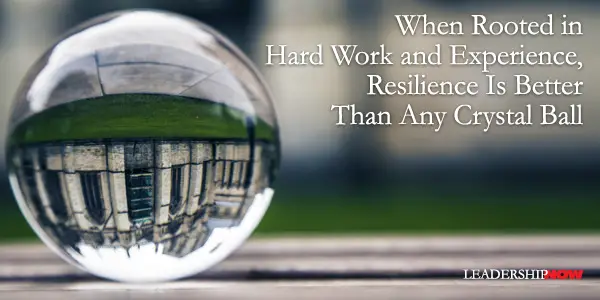
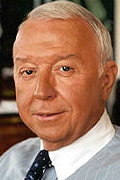 There’s a well-worn saying that “I wish I knew then, what I know now.” But, I beg to differ. I’m glad I didn’t know then that we would end up taking this path. That’s a key lesson that this experience crystallized for me.
Posted by Michael McKinney at 11:57 AM
12.25.08

Best Leadership Books of 2008 Our selections for the best leadership books published in 2008 are listed below. The are more books every year written than one can possibly make use of. Here at LeadershipNow we try to help you find those books that will resonate with you and thus be the most useful to you. Anne Lamott wrote in her classic, Bird by Bird: Some Instructions on Writing and Life, a wonderful statement on the importance of reading. "For some of us, books are important as almost anything else on earth. What a miracle it is that out of these small, flat, rigid squares of paper unfolds world after world after world, worlds that sing to you, comfort and quiet or excite you. Books help us understand who we are and how we are to behave. They show us what community and friendship mean; they show us how to live and die. They are full of all the things that you don’t get in real life—wonderful, lyrical language, for instance, right off the bat. And quality of attention: we may notice amazing details during the course of a day but we rarely let ourselves stop and pay attention. An author makes you notice, makes you pay attention, and this is a great gift. My gratitude for good writing is unbounded." Here are a few biographies that we found had the power to correct, inspire and motivate.
Posted by Michael McKinney at 12:22 AM
12.24.08

Using Information to Develop Productive RelationshipsIn any field, the ability to immediately connect with others through knowledge of a particular subject is vital to solidifying relationships, getting ideas across, and gaining trust. But using tricks and shortcuts to artificially produce this affect – such as peppering conversation with jargon or random facts – can seem transparent at best, and will often backfire … sometimes with disastrous results.How to Become an Expert on Anything in Two Hours, written by Gregory Hartley and Maryann Karinch sounds like something more akin to a con job. But it’s not about fooling people. It’s about connecting with people. Nobody can really be an “expert” in two hours. But anyone can learn to master information to the extent that they can establish trust and create a basis from which to go forward. There are specific techniques you can use to make information relevant to others; to use information to make a difference in other people’s lives. An expert, in this sense, can take specialized knowledge and give it context. Greg Hartley is a former military interrogator. He presents here, basic communication skills that will help you to understand human nature, identify different types of people you might encounter and assess to what extent you must plan and prepare for those different types of people in order to present yourself as an expert. He explains: In my world of interrogation, I use questions and tidbits of information to convince the source that I know enough to be taken seriously and to make him comfortable so that he will talk to me. I create an ally through the way I use information. In some cases, "ally" means nothing more than a common understanding that we're both soldiers and we're both professionals. I don't presume that I'm going to turn the source into a buddy, but I use information to establish common ground. If I know the same things he knows, then maybe I believe the same things he believes. That common ground gives me more credibility with him than if I came in yelling obscenities and threats. I use whatever facts and images I think will constantly remind him that he's part of the same thing that I am: a military outfit, a family, the human race. In this acute situation, I do what is takes—through a combination of planning and preparation and knowledge of human nature—to be an expert in his eyes.The authors present five general information-sorting styles and approaches to interacting with people. Understanding how they work is important to gaining someone’s acceptance of you as an expert. Technician: A detailed-oriented person who needs the facts. “If you are such a person, you place great emphasis on the source of information, and you could end up being your own biggest skeptic in trying to present expertise. If a person of this type is in your audience, one of his requirements for accepting you as he expert is going to be detail.” Generalist: People of this type “absorb information about lots of subjects and show agility in quickly grasping correlations….The generalist understands things in terms of how they relate to one another better than she understands vast amounts of details about a specific area. If you are a generalist you have a natural edge as an expert….Remember that al of your details mean nothing to the generalist unless you can translate them into meaning.” Storyteller: “The storyteller can create a bridge between the generalist and the technician without ever becoming either of them. The storyteller needs to tell stories that have a message that addresses questions squarely, allays concerns, and reminds the listener what is in it for him.” Sponge: “Strongly affected by other people’s opinions and gullible about information, the sponge will easily accept someone’s expertise because of that person’s affiliation, among other reasons.” If you are a sponge, you need to make sure you properly vet your sources. “When you are dealing with people like this, you may create a tense situation when you challenge something that they believe to be true. And the facts may have little to do with their truth.” Romantic: These people are “fanciful adventure seekers who are idealistic. Being affected more by the meaning of information than by the facts, romantics are prone to disregard the facts in favor of feelings. If you are a romantic, learn to home in on practical information in you research….When you see something that supports your belief, look past it to get more facts. If you are dealing with a romantic, try not to rain on his parade; instead, show him how to use the information you are offering to feed his picture of the world.”
Posted by Michael McKinney at 12:45 AM
12.22.08

The Age of the Empty SuitIn Peggy Noonan’s weekend column in the Wall Street Journal, she delivers another fine essay, Who We (Still) Are: A little perspective for the pessimistic “age of the empty suit.” She writes: A sober observation came from a Manhattan woman who spoke, on the night Mr. Madoff was arrested, and as word spread through a Christmas party, of the general air of collapse in America right now, of the sense that our institutions are not and no longer can be trusted. She said, softly, ‘It's the age of the empty suit.’ Those who were supposed to be watching things, making the whole edifice run, keeping it up and operating, just somehow weren't there.For several decades we have been systematically dismantling guideposts. This leads us to empty suits. When truth becomes whatever we want it to be, when all truth becomes opinion, when all opinions are equal, then the truth is nothing; it is a empty shell. Living on such a wide avenue is a road going nowhere. Far too many people and organizations have been accomplices to the crisis we face. In accepting unwarranted short-term gains, we have distorted our role in this world. “Going forth each day with a sense of deep time” requires a truth outside ourselves and building on our inheritance with a mind to those to come after us. We are all soberly reminded of this now. Often it takes a crisis of jaw-dropping proportions for us to face these often inconvenient truths. While we're at it, perhaps we also need to address the questions we're asking. Questions in search of magic pills will come up empty. It’s time to face up to the hard work of filling the empty suit with substance.
Posted by Michael McKinney at 12:24 AM
12.19.08

Geoleadership is Culturally Relevant LeadershipKevin Kelly, CEO of Heidrick & Struggles, states in The Secrets of CEOs, “Attracting talent capable of accelerating national and regional businesses has been a tremendous challenge for CEOs for years; there’s a very limited number of top-flight twenty-first-century leaders who are truly global in outlook and can take a global profit-and-loss account to another level. They’re gold dust.”It is this critical need that Eileen S. Wibbeke addresses in Global Business Leadership. Globalization has placed greater demands on leaders than ever before. In times past, differences in cultures and thinking we have been able to hold at arms length. Today, it is estimated that 70% of global business ventures worldwide fail due to mismanagement of intercultural differences. The need for leaders who are self-aware is critical for beginning to lead in a new context. Wibbeke writes that in addition to “extraordinary business leadership skills, a leader now needs cultural intelligence.” She adds, “Learning about how other cultures both define and exert leadership is crucial in gaining and maintaining market share. The challenge is how to manage multiple, simultaneous cultural identities. 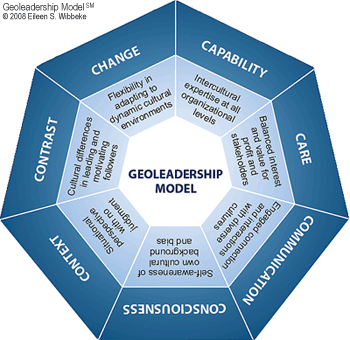 Wibbeke introduces the Geoleadership Model and considers how the concepts of care, communication, consciousness, change, and capability all vary around the world. Underlying the model is the principle of goodwill and perceiving the world through a perspective other than your own. Through case studies she demonstrates the use of the Geoleadership Model in various situations to develop an understanding and mastery of these vital intercultural competencies. Wibbeke explains, “Learning how to interact in other cultures takes effort beyond just learning another culture’s language. For the American business leader operating in another culture, interaction requires a deeper cultural understanding about how things are done. When people do not have a common frame of reference – as is found within a culture – misunderstandings, conflict, and productivity problems tend to arise.” It is interesting to note that “task-oriented people tend to have more difficulty adjusting in an unfamiliar culture.” You’ve got to pay attention to the soft-side of leadership too. For more information go to Dr. Wibbeke's web site.
Posted by Michael McKinney at 02:13 AM
12.18.08

Out of Context: Preparing Young People for Leadership and Effective CitizenshipThe competencies for both leadership and for active and informed citizenship overlap. Unfortunately, we are doing very little to prepare people for either. Mike Summers, vice president for Global Talent Management for Dell Computers, shared the following with Tony Wagner in The Global Achievement Gap: “Kids just out of school have an amazing lack of preparedness in general leadership skills and collaborative skills. They lack the ability to influence versus direct and command.” “In other words,” Wagner writes, “the only kind of leadership young people have experienced is one that relies on obedience versus the kind of reasoning and persuasion that is the new leadership style demanded by businesses organized in teams and networks.” Summers continues, “Students have a naiveté about how work gets done in the corporate environment. They have a predisposition toward believing that everything is clearly outlined, and then people give directions, and then other people execute until there’s a new set of directions. They don’t understand the complexities of an organization – that boundaries are fluid, that rarely does one group have everything they need to get a job done. How do you solve a problem when people who own what you need are outside your organization or don’t report to you. or the total solution requires a consortium of different people? How do you influence things that are out of your direct control?” —Tony Wagner,
The Global Achievement Gap
Posted by Michael McKinney at 08:42 AM
12.17.08

Preparing to Lead: Things You Should Be Thinking About NowThe Secrets of CEOs is a valuable tool for reference, inspiration and guidance. Authors Steve Tappin and Andrew Cave have assembled 150 interviews with chief executives and woven them into a lucid and absorbing guidebook on some of today’s big issues. Some of the chief executives they interviewed provided their perspective on what you need to keep in mind as you prepare to lead:Adopt the Mindset of a CEO Approach this from two levels: from the bottom up and from the top down. “From the bottom up, assume the mindset of a CEO in your core work activities: deliver first, but take a broader view on how to help the wider business be more successful. From the top down, learn to assess the business from the point of view of the CEO.” Develop Winning Habits, but Know How to Lose Most CEOs believe that their experience with serious failure or very difficult situations, were some of their most valuable experiences. Lord Browne put it, “Everything adds up to you: a book read, a business, traveling to somewhere that you fail. Experiences build character and you grow your intelligence, skill and judgment.” When CEO of Aurigo Management, Archie Norman hires people, he wants to know, “What has been that moment that you have stared into the cavern? What did you have to do where you had to confront really difficult people, people you just didn’t get along with or you didn’t like?” Be a Student of Personal Development Try to pick up a coach and a mentor pretty early on. Hone your strengths and work on your weakness where you can. Have a Life CEO Mitch Garber says, “It’s important to have not just strategic and business leadership experiences but a broad enough experience of life. For me life experience has included my marriage, bringing up my kids, setting up a shop at 14, being a lawyer, being a professional skier, and my interests in food and travel. It is diverse experiences which allow me to talk to and relate to employees at all levels.” Learn to Celebrate Your Success Take the time to celebrate successes; it will energize you to tackle the next goal. Show Total Commitment but Ruthlessly Change Role if You’re Not Being Stretched “A number of CEOs said that it was vital to absorb everything you can from every role before moving on; do not only excel in your job, but observe how the business you’re in works and what’s going on around you….Move on without regret only when you’ve sucked the experience dry.” Be True to Yourself Ben Verwaayen, former CEO of BT observes, “Authenticity is only possible with confidence because the temptation to be conformist is enormous.” The authors add, “In short, be yourself. When push comes to shove, you have to make all you big decisions with your heart; you can’t lead if you’re acting.”
Posted by Michael McKinney at 12:59 PM
12.11.08

Out of Context: The Leadership of Admiral Nelson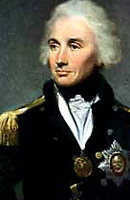 "What made Nelson a leader whose “immortal memory” we toast? In an understandable desire to construct an objective and measurable account of the competencies required of a leader there is a modern tendency to gloss over the more subtle, moral, and relational aspects of leadership. Recent research, however, by the Exeter University Centre for Leadership Studies reveals that actual practitioners of the art of leadership in various fields put a greater emphasis on the visionary and relational dimensions of leadership than the text books. "In times of danger unless there are people who have a lively sense of what is worth living and dying for then our freedom to live at peace as a society is at risk. 'But at such times of decision leaders need to make contact with foundational convictions and with a sense of calling which comes from going deep within oneself. This is the source of healthy self confidence and the ability to master fear and to encourage people in the most extreme circumstances. Any education system which hopes to produce effective leaders and followers must take the formation of these foundational convictions very seriously. "We live at a strange time when the periodic table and anything that can be quantified and reduced to a mathematical truth is regarded as an accurate description of reality but the Beatitudes and the teachings of the world’s wisdom traditions are seen as little more than the debatable opinions of dead sages.  "A sense of calling, a connection with foundational convictions derived from his belief in God who nerves his worshipers for struggle but also enjoins justice and humanity, a profound sense of the relational element in all great human enterprises - these are Nelson’s contributions to a time when we are once more facing people with fire in their minds, when we need more than efficient regulation and inspection, when we must not neglect the vital work of building up trust and a sense of common purpose among all the citizens of this country." —Bishop of London
Excerpts from the Sermon at St. Paul's on the 200th anniversary of the Battle of Trafalgar, October 23, 2005
Posted by Michael McKinney at 02:46 PM
12.10.08

Exploring the Five Key Roles Used by Effective Leaders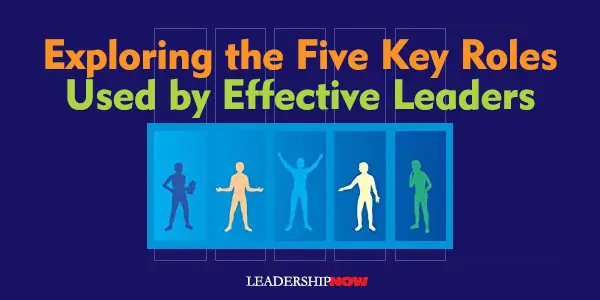 IN Making Sense of Leadership, authors Esther Cameron and Mike Green asked if leadership is making something happen that would not have otherwise happened, what is it that leaders must pay attention to? They came up with five naturally occurring areas of concern:
IN Making Sense of Leadership, authors Esther Cameron and Mike Green asked if leadership is making something happen that would not have otherwise happened, what is it that leaders must pay attention to? They came up with five naturally occurring areas of concern:
• Discomfort: What’s not working? Where is the organization hurting?
These areas of focus were then paired with five shifting roles used by leaders to deal with each of these areas of concern. Leaders must draw their cues from the environment in which they lead. These roles are: • Edgy Catalyser: Focuses on discomfort, asks difficult questions, spots dysfunction and resistance, creates tension for change.
The authors discuss each of the five roles in detail and show in what context they can be used. They offer a valuable self-assessment and demonstrate ways to expand your role repertoire. Knowing which role or roles you tend to gravitate to is important in a number of ways. Understanding your own tendencies helps you to know which areas you can build on and what you can expect to achieve. It also helps you to know which roles you could develop to make yourself more flexible, but more importantly, it helps you to know the kinds of leaders you should surround yourself with to accomplish your organizational goals. Leaders don’t all have to be highly dominate people; they don’t all have to be interpersonal wizards. It’s not essential for all leaders to be electrifying speakers and leading-edge thinkers. Neither is it essential for every single leader to be superbly organized…but it does help to be at least some of these things. And leaders have to learn to develop the right mix of role to match their personality, the organizational situation and the people around them. 
Posted by Michael McKinney at 11:36 PM
12.08.08

John Bogle on What is Enough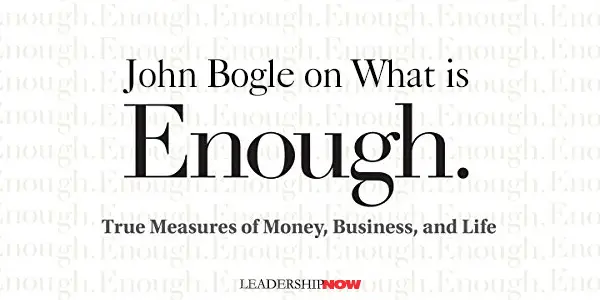
WE are about to begin a new year that is bursting with faith in hope. Whether that faith is justified remains to be seen. Yet you would be handicapping yourself if you did not read and reflect on John Bogle’s tour de force, Enough: True Measures of Money, Business and Life. The book is a result of a fair amount of reflection by Bogle himself. He offers a critique of American society today and asks what is or should be "enough" in money, in business, and in life. It is a book about character. He writes that “not knowing what enough is subverts our professional values” and leads us astray in life in general. “We too often bow down at the altar of the transitory and finally meaningless and fail to cherish what is beyond calculation, indeed eternal.” Not having grasped the concept of enough, we have seen the “subversion of our character and values.” We live in a time that values achievement over character. When the two collide, character often takes a back seat, and relationships of all kinds are shattered. Bogle observes that while the financial represents the worst of it, what we see today is not just a financial sector problem, but a societal problem. There is really just too much greed everywhere. He laments that we rely on numbers to give us facts that are really not facts: As I have earlier noted, the most important things in life and in business can’t be measured. The trite bromide “If you can measure it, you can manage it” has been a hindrance in the building a great real-world organization, just as it has been a hindrance in evaluating the real-world economy. It is character, not numbers, that make the world go ‘round. How can we possibly measure the qualities of human existence that give our lives and careers meaning? How about grace, kindness, and integrity? What value do we put on passion, devotion, and trust? How much do cheerfulness, the lilt of a human voice, and a touch of pride add to our lives? Tell me, please, if you can, how to value friendship, cooperation, dedication, and spirit. Categorically, the firm that ignores the intangible qualities that the human beings who are our colleagues bring to their careers will never build a great workforce or a great organization. Enough is really about discovering what is really important in our lives. While Bogel is optimistic, he says that he has “developed a profound concern that our society is moving in the wrong direction.” The only way to work our way through today's deep-seated problems is to return to values that “stem from principle, virtue and character.” It’s a call to redefine success in our own lives. We have more than enough of the fool’s gold of marketing and salesmanship and not enough of the real gold of trusteeship and stewardship….We focus too much on things and not enough on the intangibles that make things worthwhile; too much on success (a word I’ve never liked) and not enough on character, without which success is meaningless….Our society cannot and should not tolerate the substitution of moral relativism for a certain form of moral absolutism, and its debasement in the ethical standards of commerce. 
Posted by Michael McKinney at 09:57 PM
12.04.08

What is the Secret of Great Performers?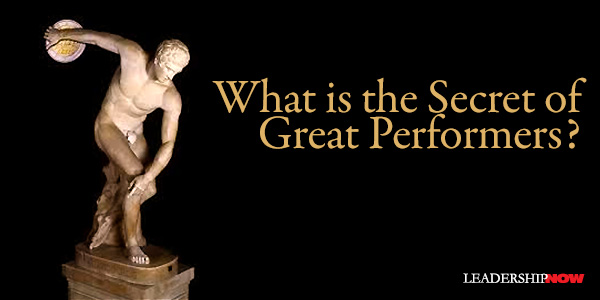
MALCOLM GLADWELL tells us in Outliers that when it comes to success, context is everything. Only by asking where a person comes from can we understand who succeeds and who doesn’t. Geoff Colvin would agree but there’s more. In Talent is Overrated, Colvin rightly asserts that “great performance is in our hands far more than most of us ever suspected.” When many people never become outstandingly good at what they do, no matter how many years they spend doing it, why do some people become excellent at what they do? Colvin convincingly argues that in general, it’s not innate gifts or intelligence, but what researchers call deliberate practice that creates world-class performers. A study by Anders Ericsson and his associates concluded that “the differences between expert performers and normal adults reflect a life-long period of deliberate effort to improve performance in a specific domain.” Deliberate practice is not your normal practice. It contains several important elements: it’s designed specifically to improve performance (usually with a teacher or coach), it can be repeated ad nauseam, feedback on results are continuously available, it’s highly demanding mentally (focus and concentration), and it isn’t much fun. Add passion and the good news is that great performance is not reserved for a preordained few. It is available to everyone. Colvin’s homework makes a great case for the idea that leaders are developed. What is alarming is Colvin's observation that “At most companies—as well as most educational institutions and many nonprofit organizations—the fundamentals of great performance are mainly unrecognized or ignored.” He writes that organizations that apply the principles of great performance follow several major rules:
Talent is Overrated is the most readable and pragmatic book on the topic. The examples and relevant research cited are compelling and his application of great performance principles to self-development, business development, and innovation are thought-provoking. Related Interest:

Posted by Michael McKinney at 02:29 AM
12.01.08

First Look: Leadership Books December 2008Here's a look at some of the best leadership books to be released in December.




Posted by Michael McKinney at 03:47 AM
|
BUILD YOUR KNOWLEDGE


How to Do Your Start-Up Right STRAIGHT TALK FOR START-UPS 
Grow Your Leadership Skills NEW AND UPCOMING LEADERSHIP BOOKS 
Leadership Minute BITE-SIZE CONCEPTS YOU CAN CHEW ON 
Classic Leadership Books BOOKS TO READ BEFORE YOU LEAD |
|